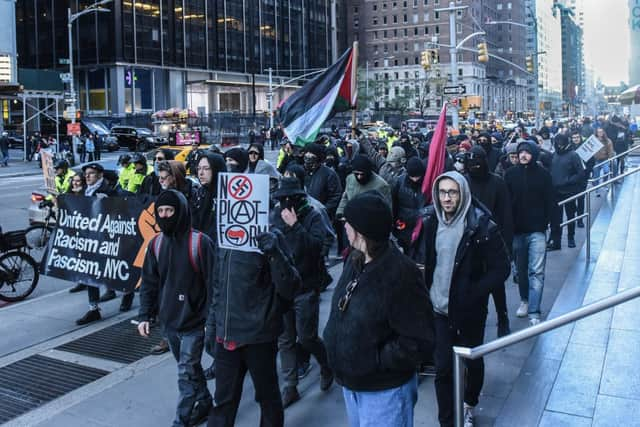Donald Trump is labelling Antifa as a terrorist organisation - here's why


In the wake of nationwide protests against police brutality, President Donald Trump has blamed unrest and violence in the United States on anti-fascism activists.
Tweeting on Sunday night, as protests over the death of George Floyd continued to rage, President Trump said: “The United States of America will be designating ANTIFA as a Terrorist Organization.”
Advertisement
Hide AdAdvertisement
Hide AdAttorney General William Barr echoed President Trump’s sentiment, stating: "The violence instigated and carried out by Antifa and other similar groups in connection with the rioting is domestic terrorism and will be treated accordingly”.
Critics of the president have been quick to point out that Antifa is a loose term for activists who oppose far-right violence and politics, rather than a single organisation with leadership and membership.
Others have noted that the United States does not currently have a domestic terrorism law and highlight that the President has shown restraint in condemning violent far-right and white supremacist organisations.
Who are Antifa?
Antifa is short for anti-fascist action.
More a movement than an organisation, Antifa strongly, sometimes violently, oppose fascism, racism, white supremacy and homophobia.
Advertisement
Hide AdAdvertisement
Hide AdMost followers strongly oppose President Trump’s nationalist, anti-immigration and anti-Muslim policies, as well as all types of racism and sexism.
What separates them from the mainstream left is their anti-government and anti-capitalist views.
Antifa activists have been known to target fascist, racist or far-right followers with property damage, physical violence and digital activism.
The movement became more prominent in 2017 when they opposed a gathering of white supremacist, alt right and neo nazi groups in Charlottesville, Virginia.
Advertisement
Hide AdAdvertisement
Hide AdPresident Trump refused to explicitly criticsie the far-right groups and said there was violence on “many sides”.
European origins
The first anti-fascism movements were formed in response to Italian dictator Benito Mussolini, whose National Fascist Party rose to power in the 1920s.
These were typically street fighting armies with similar movement set up to oppose Adolf Hitler’s Nazi party in Germany.
Following World War Two anti-fascism groups continued to oppose fascist movements, including in the UK where fascist Oswald Mosley’s followers were met with opposition by 43 Group, an anti-fascist group of Jewish ex-servicemen.In the ‘60s and ‘70s, far-right party National Front was met with opposition by an assemblage of multiracial radicals
Advertisement
Hide AdAdvertisement
Hide AdIn Germany anti-fascist activists took to wearing all black and masks in response to post-war nazism.
Growth in the United States
Anti-fascism movements grew in the United States in response to a rise of the racist skinhead punk movement. SHARP (Skinheads Against Racial Prejudice) was one of many movements formed to remove white supremacists from the punk scene.
Perhaps the first group in America to form under the banner antifa was the Rose City Antifa, a movement formed in Portland, Oregon to oppose a skinhead festival.
The US antifa movement has grown in popularity since Donald Trump’s election in 2016.
Why is Trump labelling them as a terrorist organisation?
Advertisement
Hide AdAdvertisement
Hide AdProtests have been taking place across the United States since the death of black man, George Floyd, in police custody.
Demonstrations have turned violent in some cities with police using rubber bullet and tear gas canisters to disperse protestors.
In some instances arson and looting has taken place. President Trump has placed the blame for the escalation in violence on the antifa, labelling them “Radical Left Anarchists”.